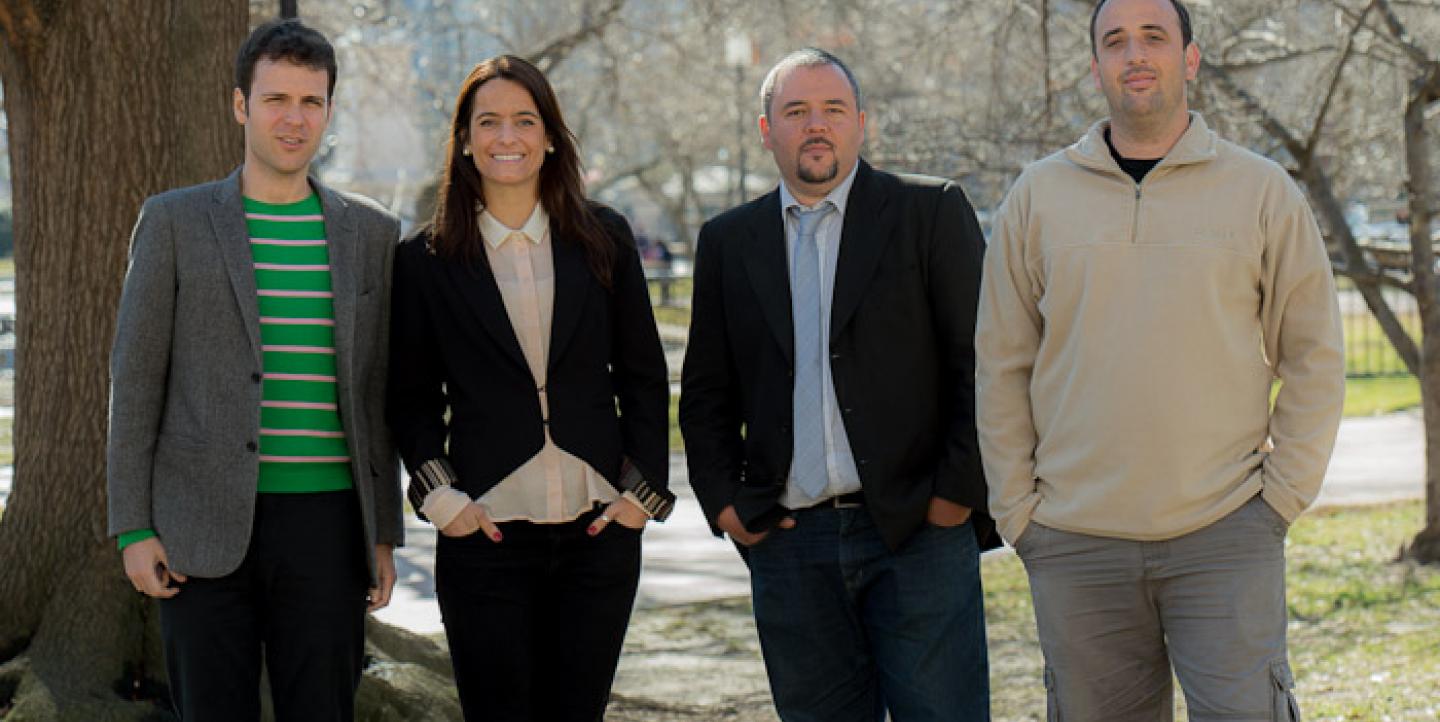In Latin America, as in most of the world, technological change is coming to the news industry in fits and starts. Four media leaders are aiming to speed up the process this year, by collaborating as Knight International Journalism Fellows.
The fellows, three from Latin America and one originally from Portugal, have a deep understanding of the media landscape and experience as pioneers in their newsrooms and communities. Mariana Santos took interactive and visual storytelling at The Guardian to new heights. Miguel Paz built a site that reveals links among Chile’s elite and was deputy director of El Mostrador, the country’s first online news website. Brazil's Gustavo Faleiros is an expert in using maps to tell environmental news stories. And Mariano Blejman built a platform to analyze patterns in the disappearances of thousands of people during Argentina’s violent military dictatorship in the 1970s.
Together, they will build networks of journalists, illustrators, technologists and data scientists. They will create or adapt tools that improve the quality and distribution of news and create a Latin American data journalism toolkit and online community. Along the way, they’ll share their expertise as thought leaders here on IJNet.
As they prepared to start their fellowships (announced today), they talked with IJNet about the state of Latin American media and why the time is ripe for innovation in news.
IJNet: What needs to change in Latin American media? What problems do you see there that you think technology could help solve?
Miguel Paz: There is a digital literacy gap that affects really good journalists who are great field investigators but do not know how to use tech tools to do data journalism to improve their reporting and storytelling skills. Latin American media as well as Latin American journalism schools need a major cultural and mindset change to embrace disruptive innovation and experimentation; incorporate lean methodologies and design thinking of product development; use technology to improve their research, storytelling and usability to adapt to how and where their users/audience are consuming information.
This cultural shift must include understanding that media must see themselves as information engines in the information business, no longer tied to a specific format, but instead as engines that adapt to the requirements and problems of their users.
Mariana Santos: The part I think could do with a bit of improvement and empowerment is on the storytelling side: how to package the content into a compelling, immersive, engaging and simple-to-use narrative. I would love for Latin American countries to take better advantage of the visual heritage they have already established.
How can we bring more women into technology in news? I think women are an essential asset in the tech environment in newsrooms, but you don’t find enough of them there.
Gustavo Faleiros: In Brazil and neighboring countries, the media are still trying to migrate their operations to a more integrated workflow among different professionals. In other words, they are still trying to make digital and traditional forms to live and grow together. This process is taking longer than expected, and I think there is too often fear in the face of change. A cultural change is needed in newsrooms to push for the creation of more tech-savvy teams and professionals with greater data knowledge.
Mariano Blejman: Journalism needs to reinvent itself. Too often, good ideas die because media cannot find ways to finance or promote the work, either within or outside established structures. In our experience with Hacks/Hackers Buenos Aires we have seen, studied and followed how new projects to rethink journalism in Latin America evolve, where they go, how they live, survive and die. The goal is to build bridges among journalists, programmers and designers, audiences and regional markets. We also need to make structural changes in existing institutions.
IJNet: Is this the right moment for media innovation in Latin America? Why or why not?
Miguel Paz: I totally agree that this is the right time. There are already people and organizations innovating: Hacks/Hackers Buenos Aires, La Nación Data from Argentina, La Nación from Costa Rica, El Faro in El Salvador, Junar.com, just to name a very few. There are also lots of hackers and members of the startup community getting together to start using open data and big data for many purposes. 2013 will be a jump-start year for digital media and civic media innovation. Getting the owners of media groups on board will be something to work on. I am sure they will come around when they see that this is good business for them. Learn about Paz’ project here.
Mariano Blejman: During the past two years since we launched Hacks/Hackers Buenos Aires, we have seen a process of cultural transformation in mainstream media and a rapprochement between journalists and programmers in newsrooms. Journalists, editors and programmers are starting, and acting. It’s time to push those changes inside and outside the media traditions. It is time to build bridges to cut the gap between developed countries and Latin American media. Learn about Blejman’s project here.
Mariana Santos: I believe now is the perfect time to invest resources and energy in Latin America due to its strong growth, an amazing energy in the air of committing to innovation, its embrace of change and its determination to become better and stronger. The people will make it happen. Learn about Santos’ project here.
Gustavo Faleiros: This is the time, no doubt. All the editors and people who decide about the budgets of media groups know that innovation is needed. As everywhere, many are looking for the best business model to fulfill this need. But it is happening, slowly, and we can accelerate that this year. Learn about Faleiros’ project here.
Photo of Gustavo Faleiros, Mariana Santos, Mariano Blejman and Miguel Paz by Kaveh Sardari.
IJNet helps professional, citizen and aspiring journalists find training, improve their skills and make connections. IJNet is produced by the International Center for Journalists in seven languages--Arabic, Chinese, English, Persian, Portuguese, Russian and Spanish--with a global team of professional editors. It is supported by donors including the John S. and James L. Knight Foundation.


